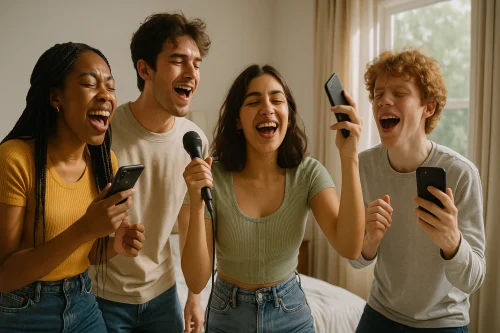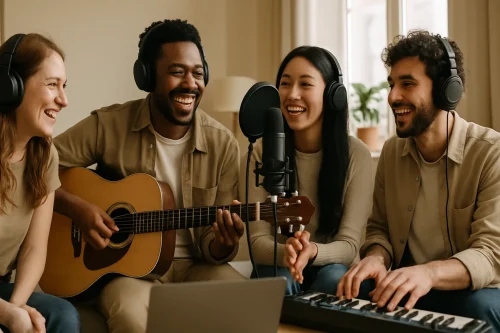Have you ever found yourself singing your heart out to your favourite song and wondered what it would be like to share that joy with the world? In today’s digital age, millions of music lovers like you are doing just that, not just listening, but participating, performing, and connecting through music. This is where the concept of the fansqinger comes in.
A fansqinger isn’t just a music fan. You’re a creative force who engages deeply with songs, sharing covers, joining duets, and building meaningful communities online.
In this blog, you’ll discover what makes fansqingers different, why this movement is transforming the global music scene, and how you can be part of it too. If music is your passion, you might already be a fansqinger, and this is your stage.
What Exactly Is a Fansqinger?

The term fansqinger blends “fan” and “singer,” but it means much more than that. You’re not just enjoying your favourite artists passively. You’re stepping into the spotlight, creating your own versions of their work, and joining a wider cultural wave. A fansqinger records, remixes, sings, and collaborates, often online, to share that emotional connection with others who feel the same.
You may use your phone to sing a chorus on TikTok, perform a full-length YouTube cover, or jump into a live Instagram duet. Unlike traditional fans, fansqingers blur the line between creator and audience. You add your voice to the music you love, creating a collaborative energy between you and the artist.
What makes you unique as a fansqinger is your mindset, you believe that music is not just to be heard, but lived, experienced, and shared. That’s the heartbeat of the fansqinger movement.
How Did the Fansqinger Movement Begin?
In the early 2010s, music fans began to realise that social media wasn’t just a platform to consume music, it was a stage. The fansqinger movement was born from this shift, where you and others like you started using digital tools to become more than listeners.
Which Platforms Sparked the Fansqinger Trend?
- TikTok allowed short, punchy singing clips to go viral fast, letting fans show off their voices in seconds.
- YouTube became a home for longer cover videos, reaction content, and collaborations.
- Instagram introduced reels and live sessions, where fans could duet in real time or go live with their favourite creators.
These platforms didn’t just host content. They gave you tools, from filters and effects to duet modes and hashtags, to participate in the culture, not just observe it.
What Role Did Social Media Play in Its Evolution?
Social media turned singing into a communal activity. What used to be private, singing alone in your room, became public, shared, and celebrated.
Through comments, reactions, and duets, fans formed connections with each other, building a new kind of interactive audience. You weren’t just liking a video, you were joining the chorus.
As more people joined in, communities started forming. Some gave feedback on technique, others just offered encouragement. This shift gave rise to the term “fansqinger,” a label that reflected a new identity: not a celebrity, not a fan, but something in between, a creator with passion and a purpose.
Today, this evolution continues, and you’re now part of a global digital choir. From a solo in your bedroom to a harmony of thousands across the world, your voice matters.
Why Are Fansqingers Reshaping the Music Industry?
The music industry is no longer a one-way street. As a fansqinger, you are actively shaping how songs are promoted, shared, and even created. Your cover of a new single could push it into new fan circles. Your duet might go viral and give the original artist a boost.
Artists and record labels have started to notice that when you sing their lyrics, you’re spreading their message with authenticity. Your voice becomes a marketing tool, an emotional amplifier, and a creative expression. This organic promotion builds trust and long-term loyalty between you and the artist.
Some creators now host singing challenges specifically for fansqingers, reposting covers or featuring them on official platforms. You are no longer just following trends, you are driving them. This shift towards community-led creativity is changing how the industry works, making music more inclusive and interactive for everyone.
What Makes Singing So Emotionally Powerful?

When you sing, you do more than hit notes, you express emotion. For fansqingers, this emotional release is at the core of what makes the experience so special. Singing taps into joy, nostalgia, love, and healing. It’s personal, yet universal.
- Music activates deep emotional centres in your brain.
- Singing out loud can reduce stress and lift your mood instantly.
- Performing your favourite lyrics makes them more meaningful to you.
Fansqingers often report feeling more confident and connected after sharing their music. It’s not about being perfect, it’s about being honest. Through singing, you build a stronger sense of identity and belonging.
And when others respond to your voice with kindness or encouragement, that emotional impact grows even stronger. In many ways, fansqinging is therapeutic. You’re not just making music, you’re creating a space to be seen, heard, and understood.
Is Social Media the Home Base for Fansqingers?
Social media platforms are where the fansqinger culture thrives. These digital spaces give you a platform to be both seen and heard, no matter your skill level or background.
- TikTok lets your 15-second clip go viral in minutes.
- YouTube helps you build a dedicated following through consistent uploads.
- Instagram connects you in real time through reels, stories, and live sessions.
These platforms allow for fast, visual, and sound-rich content. You can sing a duet with someone across the globe or receive comments from an artist you admire. And the beauty of it all? Every person has a stage.
Whether you sing in your kitchen or at a festival, social media makes sure your performance can reach thousands. It’s this level playing field that makes fansqinging feel so exciting. Your next post might just inspire someone else to join the movement too.
How Are Artists Responding to Fansqingers?
Artists are increasingly embracing the fansqinger movement. You bring their lyrics to life, and they’re paying attention. Many artists now view fansqingers as creative partners rather than just admirers. They repost your covers, host contests, and sometimes even invite fans to perform alongside them in virtual or live events.
These collaborations aren’t just for exposure, they’re a reflection of how modern music has become a shared space. Artists appreciate your authenticity because it proves their music is connecting on a deeper level. The more you engage, the more visible and valuable your contributions become.
This two-way interaction is changing the artist-fan dynamic. Instead of being separate from the creative process, you’re right in the heart of it. As fansqingers grow, more musicians are recognising that community-driven creation is the future.
How Can You Become a Fansqinger?
Starting your journey as a fansqinger is easier than ever. All you need is a love for music and the willingness to share your voice.
- Choose a song that resonates with you emotionally.
- Record using your phone or a simple microphone setup.
- Post your content on platforms like TikTok, YouTube, or Instagram.
- Use relevant hashtags to increase visibility.
- Engage with others by commenting, dueting, or collaborating.
Remember, you don’t need to be professionally trained. Your passion is what draws people in. Many of the most successful fansqingers began by simply singing along in their bedrooms. It’s not about perfection, it’s about connection. Once you share your voice, you’re already part of something powerful.
What Is the Fansqinger Community Culture Like?

At the heart of the fansqinger movement is a supportive and inclusive community. You’ll find encouragement, collaboration, and genuine appreciation from people across the globe. When you post a song or a cover, others often respond with kindness, tips, and positive feedback.
This isn’t just a fan group, it’s a space where everyone is both a performer and an audience member. Cultural backgrounds, languages, and musical styles mix effortlessly. People lift each other up, and it’s common to form lasting friendships through shared music.
What makes this culture unique is its emotional safety. You don’t have to fear judgment or comparison. Whether you’re shy or confident, experienced or a beginner, there’s room for you. Music brings people together, and in the fansqinger world, every voice counts.
How Is Technology Helping Fansqingers Evolve?
Technology is opening new doors for you as a fansqinger. Tools like AI-powered apps make it easy to remix songs, add harmonies, or improve your audio in seconds. You no longer need a recording studio, your smartphone can handle it all.
Virtual concerts are also gaining popularity. Artists and fansqingers can now perform together online, breaking down physical barriers. This gives you access to experiences that would have been unthinkable a decade ago.
Live streaming, voice filters, and even auto-tune apps have democratised music creation. Whether you’re tech-savvy or a beginner, these tools help you elevate your content and reach a wider audience. The future of fansqinging is powered by creativity and innovation, and with each new tool, your possibilities expand.
Do Fansqingers Really Make a Global Impact?
Yes, fansqingers are contributing to a truly global cultural shift. When you post a cover of a song in a different language or remix a cross-genre hit, you’re introducing audiences to music they might never have explored.
Fansqingers from different countries are connecting over shared musical interests, creating a web of cultural exchange. Someone in the UK could be inspired by a fansqinger from Brazil, just as a singer in India might cover a song originally performed in French.
This cross-cultural flow is powerful. It spreads understanding, appreciation, and unity. You’re not just participating in music, you’re shaping how it travels, evolves, and resonates across borders. Every time you share your voice, you’re adding to a global harmony that connects us all.
What Challenges Do Fansqingers Face?

While the fansqinger community is filled with passion and positivity, it also comes with its fair share of challenges. As someone entering or already active in this space, you might encounter a few hurdles that could affect your motivation or progress.
- Stage fright or fear of judgment: Sharing your voice online can be intimidating, especially when you’re just starting out.
- Negative comments or online criticism: Unfortunately, not all feedback is kind. Handling criticism is part of growing your confidence.
- Limited resources: Not everyone has access to high-end equipment, but this can often be balanced with creativity and affordable tools.
- Visibility struggles: With so many voices online, getting noticed takes time and consistency.
Despite these obstacles, the fansqinger community is known for its resilience. Fellow creators offer support, inspiration, and practical advice. Your love for music and your persistence can turn every challenge into an opportunity to grow. Keep sharing, keep singing, and know that every voice, including yours, adds value to the collective sound.
Can Fansqinging Improve Your Mental Health?
Absolutely. Singing is more than a performance, it’s an emotional outlet that can significantly benefit your mental wellbeing. Many fansqingers find comfort and healing through their participation in this expressive and uplifting community.
- Singing releases endorphins, which naturally improve your mood.
- Group participation reduces loneliness, especially when singing with others online.
- Creative expression allows you to channel emotions like anxiety, sadness, or stress into something positive.
- Supportive feedback boosts confidence and reminds you that your voice matters.
Whether you’re dealing with personal challenges or simply need a break from the world, singing your favourite lyrics can lift your spirits. The fansqinger community often rallies around its members during tough times, sharing uplifting content and encouragement.
In many ways, fansqinging becomes a kind of musical therapy. You’re not just sharing a song, you’re opening up emotionally in a safe space, and that connection can be incredibly healing.
What’s Next for the Fansqinger Movement?
The fansqinger movement is far from a passing trend. With technology evolving and more people discovering the power of creative expression, the future looks brighter than ever. You can expect to see more collaborative tools, interactive performances, and official recognition from the music industry.
Record labels are beginning to invest in fansqinger-led campaigns, hosting global challenges and even scouting talent from these communities. Virtual reality and AI tools are expanding the stage, making it possible for you to perform with fans across the world in real time.
As this movement continues, your role as a fansqinger will only grow. Whether you’re creating content, supporting others, or sparking musical trends, you’re helping to redefine how the world connects through sound. This isn’t just the future of fandom, it’s the future of music.
Conclusion
Music has always had the power to unite people. But now, as a fansqinger, you’re part of a revolution that’s transforming how we engage with it. You’re not just listening to songs, you’re participating, sharing, and inspiring others.
Through the fansqinger community, you’ll find more than just voices. You’ll discover encouragement, emotional expression, and cross-cultural connection. You’ll become part of something bigger, more meaningful, and lasting.
So if you’ve ever sung along in your room, posted a short cover, or dreamed of sharing your love for music, don’t wait. The fansqinger movement is already here, and your voice is what it’s missing.
FAQs
What does fansqinger actually mean?
It’s a blend of fan and singer, representing music fans who sing, share, and engage deeply with their favourite songs.
Do I need any training to become a fansqinger?
No formal training is needed. As long as you love singing and sharing music, you’re already on the right path.
Can fansqingers earn from their content?
Yes, some fansqingers earn through sponsorships, ads, and collaborations, though many do it for the joy of connection.
Where do most fansqingers share their performances?
Popular platforms include TikTok, YouTube, and Instagram, where engagement is high and features support musical creativity.
Is the fansqinger space safe and supportive?
Yes, most communities are built on positivity and kindness, though staying respectful and following platform rules is essential.
What makes fansqingers different from traditional fans?
Fansqingers participate creatively by performing and collaborating rather than just consuming music passively.
How do fansqingers help the music industry?
They boost song visibility, enhance engagement, and contribute to authentic fan-driven promotion and collaboration.








